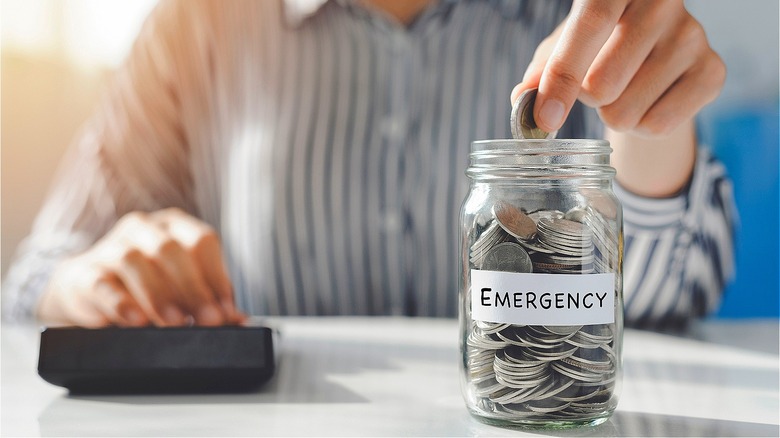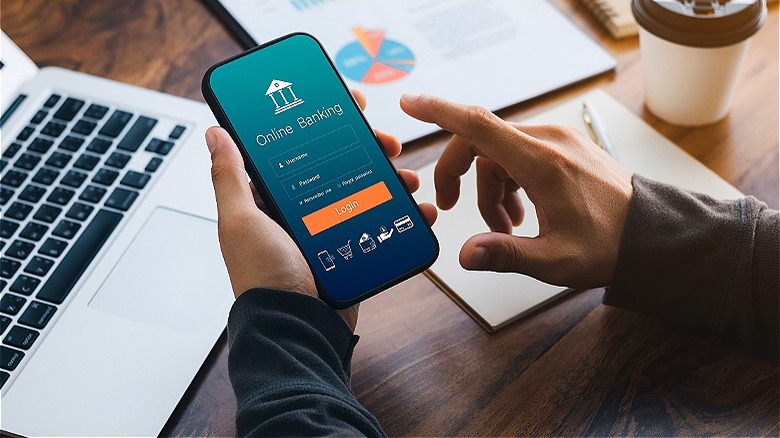How Much Money Should You Have In Your Emergency Fund?
Whether from a friend, coworker, or even financial professional, you've probably heard the advice that you should keep an emergency fund for life's unexpected curveballs. An emergency fund can not only help in cases of emergency expenditures, such as car repairs or medical bills, but this fund can also provide a sense of security as a holdover in the case of leaving, or even losing, a job. However, while creating an emergency fund is absolutely a great financial idea, it can be difficult to know just how much to aim for with this kind of fund.
There are several things to consider when deciding on an emergency fund amount goal. Lifestyle, income, and even job security can all be determining factors in how, and how much, to contribute to an emergency fund. Plus, beyond the amount you decide on, there are also factors like what kinds of accounts or financial avenues you should pursue in order to make your emergency fund work best for you. While all these considerations can feel overwhelming, a good rule of thumb is to calculate your total monthly expenses (including everything from rent/mortgage to groceries to utilities), then aim to keep at least three to six months' worth of those expenses in a specific set-aside account. This account then becomes your emergency fund, and it can provide peace of mind in addition to better financial security.
Things to consider when it comes to saving
While six months of expenses can definitely feel like an intimidating amount to set aside for a rainy day, it's important to remember you can slowly contribute toward your goal amount by setting aside a little every month. The key is to avoid feeling overwhelmed by thinking you need to save your entire emergency fund all at once. In fact, even small changes to your spending (and savings) strategies can make all the difference to your emergency fund. Whether that means cutting back on restaurants or implementing 30-day purchase delays on any big-ticket item, there are various creative ways to help tackle savings and get you closer to your emergency-fund goals.
Plus, there's the age-old question of if it's better to pay off debt or start saving money first and this can be an important consideration when it comes to how aggressively you pursue your emergency fund. Ultimately, what to prioritize comes down to your financial circumstances. Debt repayment, bills, and even inflation can all affect your ability to contribute to an emergency fund, so prioritizing more urgent expenses over long-term savings goals can ultimately make a huge difference to your long-term financial health.
Yes, savings are important — and an emergency fund can be particularly useful — but it's important not to prioritize your savings over your daily necessities. By building your savings in a slower, more healthy way, you can ensure you don't endanger your present by hyper-focusing on your future.
Helping yourself save more money
If you're looking to get a leg up on your savings goals, consider a high-yield savings account to help your money grow faster. Due in large part to the Federal Reserve's rate increases throughout 2023, many banks have raised their annual percentage yield (APY) rates on savings accounts as a way of attracting new customers. These APYs can help you earn interest on your savings account balances, and with APY rates over 5% available from many online banking institutions, it's easier than ever to earn some added interest. However, not all banks will offer high-yield accounts or raise their rates (in fact, according to the FDIC, the national average savings account APY rate is only 0.46%), so it can be worth investigating a new bank if you'd like to take advantage of more competitive APY rates.
Remember that the point of an emergency savings fund is its ease of access in a pinch so avoid any account types that might make withdrawal more difficult. For instance, using a certificate of deposit (CD) or retirement accounts like IRAs or Roth IRAs can lead to penalties and fees should you need to withdraw money from these accounts early. This makes them fundamentally less flexible than a savings account, which means they aren't the best choice for emergency situations. With all of this in mind, remember — it's incredibly important to properly balance your savings goals with your other payments and expenses to avoid any potential downfalls of an emergency fund.


